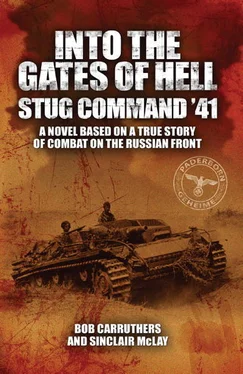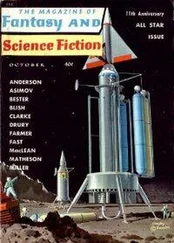There was no option but to obey and Wendorff soon found himself with a Soviet rifle thrust into his arms and the bulky ammunition stuffed into his pockets.
“You are to report to Corporal Balovsky,” said the man who issued the rifle and then pointed down the tunnel.
As he walked down the badly lit tunnel a nurse appeared and took the young girl from him. Wendorff walked on in confusion. As he did so, he could dimly make out the shapes of injured men, women and, worst of all, children. The cries and moans were heart-breaking. Many were maimed or horribly burned and the word voda was repeated again and again. The surviving nurses from the hospital moved among the suffering, offering what they could in the way of aid, but there was obviously no water to be found anywhere.
The Soviet soldiers did not waste energy in conversation. There was the odd low mumble, but the overall impression was one of silent stoicism. It appeared as if the Russians possessed vast reserves of inner strength and courage. Wendorff began to form the conviction that this was a foe to be reckoned with, the opposite of any mental picture he had been fed before being parachuted behind enemy lines. How empty, two-dimensional and utterly wrong was the propaganda that had been pumped into him! If this small border outpost was anything to go by, then God only knew what awaited them in the vast interior.
Nor was this resistance homogenous. Many of the troops were from far-flung parts of the Soviet Empire. There were Tatars, Kazakhs, Georgians, Uzbeks, Armenians, Ukrainians and what seemed like countless others augmenting the solid core of Russians. But this was no rag-tag collection of warring tribes. They were as one when it came to fighting spirit and resolve. How many different peoples had they taken on? One aspect of these national differences did work in Wendorff’s favour however. The many languages and dialects spoken meant that any discrepancies in his grammar, annunciation or general fluency were hopefully likely to pass unnoticed.
Eventually Wendorff came across a group of soldiers who were being marshalled together by a harassed corporal. The universal impulse common to every army that results in NCOs ordering subordinates to both hurry up and also to wait was present in the flustered corporal’s confusing flurry of instructions.
“Fall in, bandsman. We are going to need every man… even musicians! We have to hold out here until we are relieved. It’s going to get interesting later, so grab some rest now.”
Wendorff obediently took a seat on a step next to one of his new colleagues. There was no conversation. The atmosphere was heavy with the palpable air of shock. His attention wandered to the pretty young nurse who was tending to a bullet wound on the shoulder of a stoic Red Army guardsman. She finished her work and slumped down beside him.
“You look exhausted,” he said.
“We all are,” replied the nurse, who was obviously not in the mood for further conversation.
“Is there anything I can do to help?”
“Yes, of course there is. You can find us some water. The mains don’t work and no one seems to know what to do to get some.”
“If the corporal will permit me, I will try my best,” said Wendorff, looking over at the corporal. He didn’t expect to receive permission, but he was looking for an excuse to leave this hellish environment.
“Sure, why not?” said the corporal. “We won’t attack until nightfall. If you succeed, the wounded will thank you forever, as I’m sure Nurse Ostermann will.”
The mention of his mother’s maiden name came with a shock like a lightning bolt to Karl Wendorff. His mother’s side of the family were Volksdeutsche from Volhynia who had been driven out of the new Polish state following the last war. They had settled in Nuremberg, where she had met his father. Hearing the name was a heart-stopping moment. His first thought was that this was some twisted trick◦— that his true identity had obviously been discovered◦— and that a swift bullet in the back of the head was the best he could hope for now. However, nothing else was said and Wendorff began to breathe again. He must have misheard. His tired brain must have been playing tricks.
“If you can find water, we’ll all be in your debt,” she said, with a gesture towards those suffering the agonies of pain and thirst. “You can hear them, can’t you?” said the nurse.
“I can, and I will do my best, nurse…?”
“For what it’s worth, it’s Ostermann… Bettina Ostermann,” she said with an air of weary resignation.
Wendorff looked back at her open-mouthed in shock and unable to speak.
“I know, I know, it’s a German name,” she said, holding up a hand as if to ward off the inevitable question, “and yes, I have German blood in my veins. I’m from Volhynia, on the Soviet side of the border. If they want to kill me for it, they will.” She gestured towards her own soldiers. “Or perhaps the Germans will. Either way, I’m dead, so I may as well do what I can for them in the time I have left.”
“I’m sure that won’t happen,” said Wendorff, getting to his feet.
“Who are you to make promises? It didn’t save my uncles during the last war and it won’t save me this time.”
“I won’t let it happen,” said Wendorff, who was desperate to reveal his true self to her. He wanted to blurt out, “My mother is from Volhynia. Her maiden name is Ostermann. We could be related! Maybe we are distant cousins!” But even in his confused and terrified state he had sufficient sense to know that he must keep his deadly secret.
* * * * *
As he returned to the target, Rossheim sensed that the conventional bombers had again been at work on the Brest-Litovsk fortress. The stronghold was ablaze everywhere. Many burning vehicles lay in the parkland and on the roads, but the enemy was evidently not bolting from its lair. Dense clouds of black smoke were being driven by the freshening wind towards the west, which meant that the squadron was unable to approach from the German side. They had to go out to the east, where rogue Red fighters who had somehow avoided the destruction of the Soviet airbases might still lie in wait for their prey. As a result of his sobering experiences earlier in the day Oberleutnant Rossheim was aware of that danger and had previously informed his pilots and wireless operators of the possibility of attack from that quarter.
While flying over the north-east sector of the burning fortress at an altitude of some 3,500 metres, he first looked around for hostile planes. It was a mistake to think of the devil. Like a shot from a gun, evidently swooping down from a great height, a familiar shape whizzed past Rossheim and made an elegant curve to get behind him. The Soviet pilot of the Rata executed the manoeuvre so neatly that he was now directly beneath and behind the tail unit of the squadron leader’s machine after having flown out of the curve. It was annoying and unnecessary for half the squadron to yell out, “Rata behind you, boss!” Rossheim had already observed the fact with all desirable clarity. Repeating his manoeuvre from earlier in the day, Rossheim now depressed the nose of his ship and thundered earthwards with the expectation that the Soviet pilot would immediately follow suit. Having dived a short distance, Rossheim ran out the nose-dive brakes to lessen the speed of the dive and the Soviet pilot, unable to brake his descent, promptly whizzed past him on one side.
“See you again, comrade,” cried Rossheim sarcastically. “Some other time, perhaps.”
But the Russian was destined to never have the chance to meet German dive-bombers again. Rossheim had hardly called his sociable parting greeting after him when another aircraft shot past him like a shadow, heading in the same direction, after the Soviet plane. Rossheim just had time to recognise the black crosses in a hazy way and realised that there was no need for anxiety. He pulled his machine out of its dive and looked down, where the German Messerschmitt 109 was now shooting down the Russian fighter. The whole occurrence, from the appearance of the Rata until he was shot down by the Emil, was over in a few seconds.
Читать дальше












